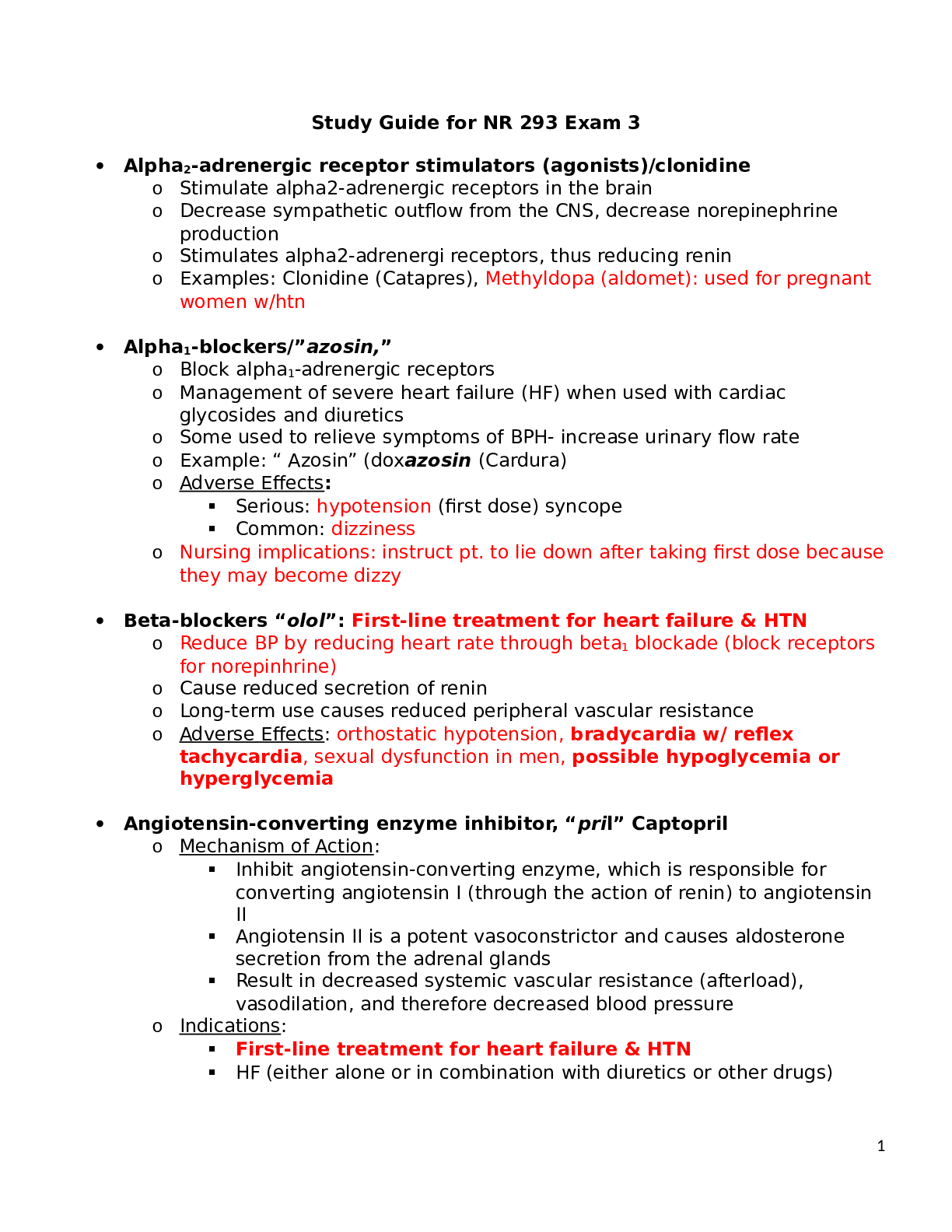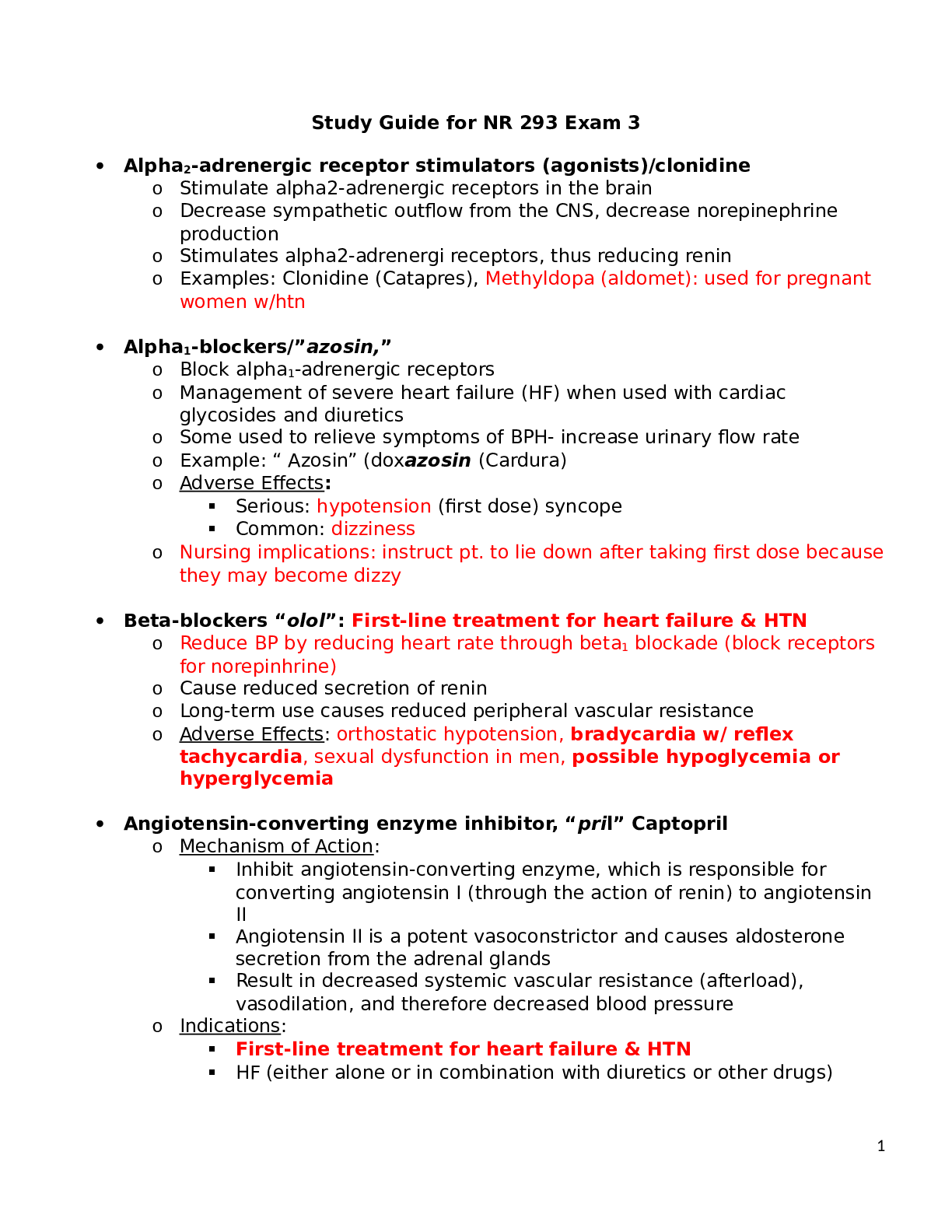Alpha 2 -adrenergic receptor stimulators (agonists)/clonidine
o Stimulate alpha2-adrenergic receptors in the brain
o Decrease sympathetic outflow from the CNS, decrease norepinephrine
production
o Stimulates alpha2-adrenergi receptors, thus reducing renin
o Examples: Clonidine (Catapres), Methyldopa (aldomet): used for pregnant
women w/htn
Alpha 1 -blockers/”azosin,”
o Block alpha 1 -adrenergic receptors
o Management of severe heart failure (HF) when used with cardiac
glycosides and diuretics
o Some used to relieve symptoms of BPH- increase urinary flow rate
o Example: “ Azosin” (doxazosin (Cardura)
o Adverse Effects:
Serious: hypotension (first dose) syncope
Common: dizziness
o Nursing implications: instruct pt. to lie down after taking first dose because
they may become dizzy
Beta-blockers “olol”: First-line treatment for heart failure & HTN
o Reduce BP by reducing heart rate through beta 1 blockade (block receptors
for norepinhrine)
o Cause reduced secretion of renin
o Long-term use causes reduced peripheral vascular resistance
o Adverse Effects: orthostatic hypotension, bradycardia w/ reflex
tachycardia, sexual dysfunction in men, possible hypoglycemia or
hyperglycemia
Angiotensin-converting enzyme inhibitor, “pril” Captopril
o Mechanism of Action:
Inhibit angiotensin-converting enzyme, which is responsible for
converting angiotensin I (through the action of renin) to angiotensin
II
Angiotensin II is a potent vasoconstrictor and causes aldosterone
secretion from the adrenal glands
Result in decreased systemic vascular resistance (afterload),
vasodilation, and therefore decreased blood pressure
o Indications:
First-line treatment for heart failure & HTN
HF (either alone or in combination with diuretics or other drugs)
1Slow progression of left ventricular hypertrophy after MI (cardio
protective)
Renal protective effects in patients with diabetes
Captopril and lisinopril can be used if a patient has liver dysfunction,
unlike other ACE inhibitors that are pro-drugs
*Pro-drugs are inactive in their administered form and must be
metabolized in the liver to an active form so as to be effective
o Adverse Effects: hyperkalemia & dry, nonproductive cough
o Serious drug interaction: NSAIDs
Angiotensin II receptor blocker “sartan” losartan (Dovan)
o Mechanism of Action:
Allow angiotensin I to be converted to angiotensin II, but block the
receptors that receive angiotensin II
Block vasoconstriction and release of aldosterone
Well tolerated, do not cause a dry cough
Indications: first-line treatment for heart failure & HTN
o Adverse Effects: URI, headache
May cause occasional dizziness, inability to sleep, diarrhea
Calcium channel blockers: Amlodipine “dipine” verapamil (calan),
diltiazem (cardizem)
o Mechanism of Action: cause smooth muscle relaxation by blocking the
binding of calcium to its receptors, preventing muscle contraction
o Adverse effect: constipation
High-fiber diet with plenty of fluids will help prevent constipation
o Indications: hypertension
Angina- ch. 23
Ischemia:
o Ischemic heart disease: Poor blood supply to the heart
muscle (Atherosclerosis, Coronary artery disease)
o Myocardial infarction (MI): Necrosis, or death, of cardiac
tissue, disabling or fatal
Therapeutic Objectives
o Minimize the frequency of attacks and decrease the
duration and intensity of anginal pain
o Improve the patient’s functional capacity
o Prevent or delay the worst possible outcome: MI
Cardiac glycosides: Digoxin
o Therapeutic level: between 0.5-2ng/mL
o Digoxin doses are held and the prescriber notified if the apical pulse is 60 beats/minute
o Negative chronotropic effect decreases HR
2o Digoxin immune Fab (Digifab) is the antidote for a severe digoxin overdose
Required use of digitab when potassium level is above 5 mEq/L, severe sinus
bradycardia that does not respond to cardiac pacing, or an overdose of more than 10
mg of digoxin.
o Avoid bran muffins when taking digoxin
o Hypokalemia increases the chance of digitalis toxicity
Class III drugs: Amiodarone (ch. 25)
o Mechanism of action: prolonging action potential duration
o Indications: ventricular dysrhythmias
o Contraindication: hypersensitivity and bradycardia or AV block
Adverse effects: FDA black box warning: pulmonary toxicity, hepatotoxicity arrhythmia worsening-sinus
bradycardia, constipation, QT prolongation, hypotension, blue-gray coloring of the skin
Read More


